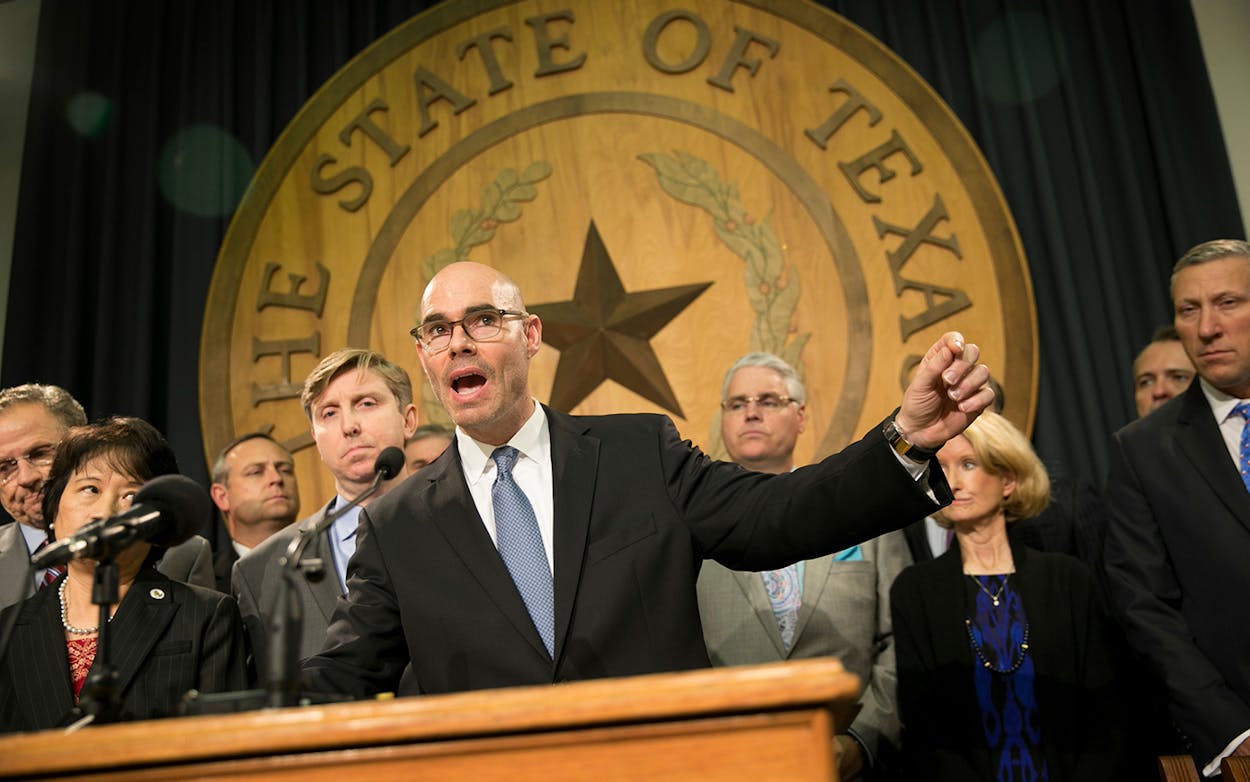At noon on Tuesday—the second Tuesday of odd numbered years, as prescribed by the state constitution—150 members of the Texas House and 31 members of the Texas Senate will be sworn into office to convene the 86th Texas Legislature. Each House member represents approximately 113,000 constituents. Each member of the Senate represents roughly 500,000 constituents. For the next 140 days, these two groups of elected officials will be locked into a marathon of public policy making, considering in excess of 6,000 bills (and rejecting most of them). Here’s my recommendation for five things to watch this legislative session.
A new House speaker
From the governor’s desk to the Senate to the House itself, all eyes will be on Angleton Republican Dennis Bonnen, who has spent twenty-two of his 46 years as a member of the Texas House. The retirement of Joe Straus, of San Antonio, had promised a rare wide-open race for a replacement. But in a testament to his skills, Bonnen was able to lock up the race within days of last November’s election. The first order of business for the House, once they are officially sworn in by new Texas Secretary of State David Whitley, is to elect Bonnen the new speaker. There’ll be a honeymoon period followed by Bonnen showing his hand, when he releases committee assignments and everyone begins counting the number of Democrats he has named to head the committees. He’ll need to assign enough that Democrats believe he has fulfilled his pledge to run a bipartisan chamber, but not so many that Republicans attack him the way many did Straus—as a Republican in Name Only (RINO) who is willing to capitulate to the minority party. Another early challenge for Bonnen is how he handles Governor Greg Abbott and Lieutenant Governor Dan Patrick. Bonnen must demonstrate the House’s independence and co-equal status with the Senate and the governor’s office. One of the key duties of a speaker is to protect his members, and Bonnen’s standing among the House could be severely diminished if there is any perception that Abbott or Patrick has an upper hand.
House Democrats
Once outnumbered in past sessions by an almost two-to-one margin, Democrats in the Texas House are returning to Austin in a good mood. The November election gave them a net gain of twelve seats (three seats remain vacant). By their estimate, they expect to eventually have a total strength of 67 Democrats compared with 83 Republicans. If they can vote as a bloc, they have enormous power to influence legislation. But voting as a bloc is a tall order. In the days after the November election, Democrats were hopeful that they could have greater influence over the selection of the next speaker. But, as Democrats are wont to do, they began defecting. Whether side deals were cut with Bonnen is still a mystery. What is not a mystery is that the House Democratic Caucus appeared unable to stop Bonnen if they had wanted to—and several members had expressed that very desire.
Social conservatives
If Democrats are happy with the November election results, social conservatives in the Legislature most certainly are not. Despite millions of dollars that were poured into the campaigns of this wing of the Republican party, the results were not good and their numbers are fewer. Many lawmakers from both parties are hoping this means some respite from wedge issues like the bathroom bill that tied up way too much time and political capital last session. The rainmaker for these social conservatives, Midland oilman Tim Dunn, funnels his money through a group called Empower Texans, which emerged as a deep-pocketed arch nemesis of Straus as the House speaker. And while Empower Texans may have celebrated Straus’s retirement, the rise of Bonnen is not good news. Bonnen was a key lieutenant of Straus’s, and Empower Texans doesn’t like him very much either. The question is which faction of the Republican party will have the upper hand—social conservatives or the business-friendly wing of the party.
Property tax and school finance reform
Property taxes and school finance reform should be the defining legislative priorities this session. Budget experts and some political leaders say the two should be considered a single issue. That’s because the two are tied: local property taxes have been historically tied to state spending on education. Since 2010, the level of state spending has dropped by a little more than 6 percent per student, according to the Legislative Budget Board. Yet state officials often are quick to blame local school boards for haphazardly raising property taxes and are looking to reform these rising taxes by limiting the amount of money that local jurisdictions can raise ad valorem taxes from year to year. Those limits, coming while student enrollment continues to grow, put school districts in a bind over how to fund themselves.
The border
President Donald Trump’s shadow will grow more defined under a Democratically controlled House in Washington, and the result could well affect lawmakers in Austin. Two sessions ago, while Barack Obama was president, the Republican-controlled Legislature easily justified allocating roughly $800 million on border security, saying it was necessary because the federal government wasn’t doing its job. One session ago, with Trump in the White House, the justification for spending that amount was tougher, but state lawmakers nonetheless coughed up an additional $800 million for border security. This session, as parts of the federal government come to a halt over a Washington debate between Congress and Trump over his $5 billion demand for a border wall, the argument for Texas to shell out anything near $800 million should provoke an interesting debate—particularly at a time when the issue of funding education is at the fore.
- More About:
- Politics & Policy
- Greg Abbott
- Dennis Bonnen
- Dan Patrick






